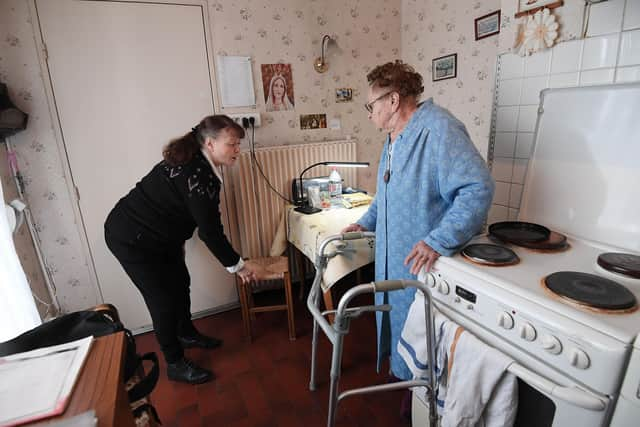Dementia Action Week; time to end this social care lottery – Judith King
The message was getting through. The social care system was no longer fit for purpose and a clear plan was needed to give every person the dignity and security they deserve. Two years on, we are still waiting for that plan, and our social care system remains on life support.
Our heroic and dedicated carers are underpaid, lacking in dementia-specific training, and undervalued for the vital work they do.
Advertisement
Hide AdAdvertisement
Hide AdIt’s not unusual to hear of people with dementia being visited by several different carers over the course of a week. This lack of continuity and shortage of quality time can leave them feeling confused and anxious.


Meanwhile, family carers are struggling to cope. Even before the pandemic hit, many were at breaking point – physically drained, emotionally spent and financially devastated by the ongoing challenge of looking after loved ones.
Lockdown has been the final straw. People with dementia have been worst hit by coronavirus, accounting for over a quarter of all deaths. Many more have experienced a marked deterioration in their condition as a result of lockdown’s knock-on effects, such as interrupted routines, loneliness and isolation.
This is why Alzheimer’s Society is now saying enough is enough. Because while dementia is not curable yet, the care system is. Put simply, we believe the Government cannot continue to kick this problem into the long grass.
Advertisement
Hide AdAdvertisement
Hide AdSocial care should be free at the point of use – and the Government needs a clear, budgeted plan with milestones and timetable to make this happen. They must ensure their reforms consider not just funding, but also improving the quality of care that people receive.


The difference between health care and social care is perhaps not always fully understood. Indeed, many people seeking to access social care for themselves or a loved one for the first time are often appalled to discover how much it costs or how difficult it is to access.
This is because, unlike free NHS health care, social care is means-tested, whether a person is in a care home or has professional carers visiting them at their home. In practice, this means that in England, if a person has been assessed as having savings and capital of £23,250 or more, they will need to fund their care and support from their own savings and income – or rely on the goodwill of unpaid family carers.
Is this really the kind of society that we expect today and that we want to grow old in? I hope not. People should not have to spend all their savings, and in many cases sell the family home too, to fund their care.
Advertisement
Hide AdAdvertisement
Hide AdThankfully, there is hope – a feeling that the tide is turning. A recent Alzheimer’s Society UK-wide survey revealed people rank social care second behind the NHS and ahead of policing, schools and housing, as a priority for funding.


The ask we are making is not unreasonable. We simply need to ensure people affected by dementia can get support that is focused on what matters to them. It should be delivered by trained and supported staff and draw upon all available sources of support where people live.
Our experience has taught us that the right care and support services can make a huge difference for people with dementia and their families.
Now, as we start to emerge from the Covid-19 pandemic, with many people with dementia continuing to experience a worsening of symptoms, we need a care system capable of giving people the support they need and deserve.
Advertisement
Hide AdAdvertisement
Hide AdThat, surely, must be the legacy of this terrible year. We urge people to join us in our campaign to Cure the Care System this Dementia Action Week.
A petition on our website calling on the Government to act now is already approaching 100,000 signatures. Please add your name to it also and let us send a clear, unequivocal message that the time for change has come. Visit alzheimers.org.uk/DAW to join the #CureTheCareSystem campaign.
The status quo cannot continue. Right now, people are spending their final years without the quality support and care they need to live the lives they want. We cannot fail them.
Judith King is Head of Services with the Alzheimer’s Society.
Advertisement
Hide AdAdvertisement
Hide AdSupport The Yorkshire Post and become a subscriber today. Your subscription will help us to continue to bring quality news to the people of Yorkshire. In return, you’ll see fewer ads on site, get free access to our app and receive exclusive members-only offers. Click here to subscribe.
Comment Guidelines
National World encourages reader discussion on our stories. User feedback, insights and back-and-forth exchanges add a rich layer of context to reporting. Please review our Community Guidelines before commenting.